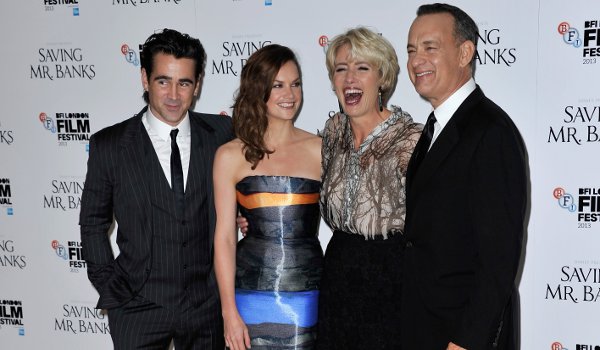Saving Mr Banks
(Walt Disney)
Director: John Lee Hancock
★★★★ (Out of 5)
“CHILDREN shouldn’t have the harshness of life sugar-coated for them,” is the stern morality expressed by author PL Travers in Saving Mr Banks, John Lee Hancock’s film about the making of the Walt Disney classic Mary Poppins (1961).
Saving Mr Banks headlined recently at the London Film Festival and is already slated for Oscar nominations.
It retells the surprisingly dark events that brought Julie Andrews and her flying umbrella to the screen, along with Dick Van Dyke’s “caawrblimey” cockney accent.
Doing so, it reveals the drama of the mental tussles that occurred among the creative minds behind the iconic children’s film and especially those between Travers and Disney himself.
The movie exposes some non-Disney-like themes within the human psyche. Travers (Emma Thompson) is cussedly devoid of romanticism and only agrees to the screen adaption of her story because she needs the money.
Disney (Tom Hanks) is producing the movie to honour a pledge he made to his daughters. One reckons that storytelling shouldn’t mask ugly realities; the other feels it’s vital to preserve the innocence of childhood – even for adults.
To find the origins of Mary Poppins, we must travel back in time to an unexpected place. We discover that the initial inspiration for the tale stemmed from Travers’ unsettled upbringing, and particularly the behaviour of her feckless father.
Travers Robert Goff was born into a struggling London-Irish family in Deptford in 1862. Goff would sometimes claim descent from an old Wexford dynasty, but his dreams took a new direction when he emigrated to Australia, where he married and fathered two daughters.
The eldest was christened Helen in 1899, but she later adopted the pen-name PL Travers.
 The stars of Saving Mr Banks (From L to r): Colin Farrell, Ruth Wilson, Emma Thompson and Tom Hanks
The stars of Saving Mr Banks (From L to r): Colin Farrell, Ruth Wilson, Emma Thompson and Tom HanksGoff was a hopelessly deluded drunkard and though he enjoyed some success in banking, rising to the position of manager, his actions became so erratic he was later dismissed.
He died of consumption at 42, leaving his young family broke and stranded in rural Queensland. They were saved by a prim but pragmatic aunt, who straightened out the household and restored the mother to emotional health after a suicide attempt.
These were the real-life figures Travers transformed into fiction in her Mary Poppins novels (writing six in all) – her aunt becoming the magical nanny and her errant father the hapless Mr Banks.
It was never her intention to write gentle, sentimental tales, rather to tell unflinching stories to exorcise, or at least express, her childhood demons.
This forms the dramatic conflict at the core of Saving Mr Banks, with the schoolmarm persona of Travers resisting Disney’s insistence on childlike cheer and his determination to locate the little girl lost inside of Mary Poppins’ creator.
There’s a piquant moment when Disney takes Travers to Disneyland, a scene which might have been cloying if we didn’t learn that “Old Walt” has done this for a ten-dollar bet.
Colin Farrell plays the consumptive-alcoholic father. The narrative places him away from the main action but he’s brought in through flashbacks in Travers’ memory, a constant avatar of his daughter’s distressing past.
One sequence shows her rehearsing songs with the Sherman brothers, but reveals her mind’s eye where the lyrics appear in the mouth of her drunken dad.
Farrell hasn’t acted this vulnerable since playing Danny in Ballykissangel and although it’s somewhat sugary, Saving Mr Banks is supercalifragilistic etc, etc, etc.

